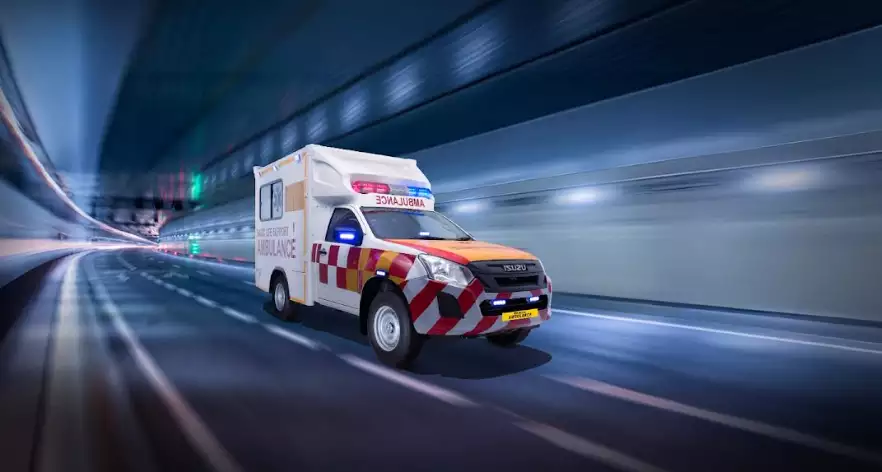Isuzu launches D-MAX ambulance at INR 26 lakh

Features
The Isuzu D-MAX Ambulance boasts features aimed at meeting the specific needs of healthcare providers in India. At its core is the Isuzu RZ4E 1.9-litre 4-cylinder VGS Turbo intercooled engine, delivering power of 120 kW at 3,600 rpm and torque of 360 Nm at 2,000-2,500 rpm. Built on the Isuzu iGRIP platform, the vehicle offers stability on both urban and rural roads, with Hi-Ride suspension and a double wishbone system ensuring a more comfortable cabin experience, the company said in a media release.
Commenting on the launch, Toru Kishimoto, Deputy Managing Director of Isuzu Motors India, said, “We are excited to present the ISUZU D-MAX Ambulance, our unique product designed for the Indian market, with 14 ‘Best-in-Class’ features. The new ISUZU D-MAX Ambulance carries forward these values, offering high-quality build and unmatched robustness, while conforming to the specifications defined under AIS-125 Type C ambulance."
"With this launch, Isuzu Motors India continues to strengthen its position as a game changer in the automotive industry, delivering quality products that are both innovative and tailored to the unique demands of the Indian market. We are confident that our ISUZU D-MAX Ambulance will set a new benchmark in the ‘Basic Life Support’ ambulance category,” he added.
Safety and comfort
The D-MAX Ambulance features a shorter wheelbase, superior ground clearance, larger tyres, and a smaller turning circle radius, making it more manoeuvrable in tight urban, semi-urban, and rural environments, the company said.
For active safety, the ambulance includes a range of systems such as Traction Control System (TCS), Electronic Stability Control (ESC), Hill Descent Control (HDC), Emergency Brake Assist (EBA), Intelligent Brake Over-ride System (BOS), Anti-lock Braking System (ABS), and Electronic Brake-force Distribution (EBD). Passive safety measures include a pedestrian-friendly front fascia, 3-point seat belts with pre-tensioners, airbags for both driver and co-driver, a collapsible steering column, and side intrusion protection beams.
The front cabin offers a twin cockpit ergonomic design with fabric upholstery, adjustable headrests, and air-conditioning to ensure a comfortable and fatigue-free experience for the driver and co-driver, the company added.
The patient transport compartment is built in compliance with AIS-125 Type C Ambulance specifications and includes mandatory warning lights, flashers, sirens, and PA systems, with high visibility stickers for added safety. The interior of the rear body is spacious and fitted with a stretcher-cum-trolley system, accessible via fully opening rear doors with a built-in ramp. The compartment also features external storage for oxygen cylinders, hoses, and an oxygen manifold system.

